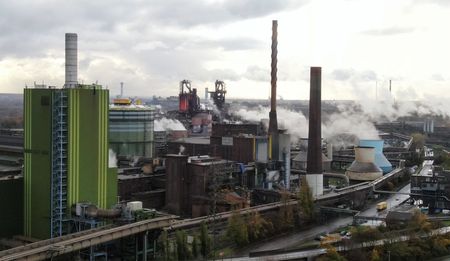By Christoph Steitz and Tom Käckenhoff
FRANKFURT/DUESSELDORF (Reuters) – Thyssenkrupp’s planned sale of its steel business is at risk over uncertainty following a leadership crisis at the unit, the head of the German conglomerate’s works council said on Friday.
The unit, a storied name in industry and a symbol of Germany’s economic rise, has been hit by a combination of weak demand, cheaper Asian products and pressure to decarbonise that have knocked its competitiveness.
“Uncertainty among the workforce is at a maximum. Fears about the future of employees and that of the company can be felt everywhere,” said Tekin Nasikkol, who also sits on Thyssenkrupp’s 20-seat supervisory board.
His comments come after Thyssenkrupp Steel Europe (TKSE) said late on Thursday its chairman, chief executive and five other supervisory and management board members would leave, reflecting a deepening dispute over the steel unit’s future.
Thyssenkrupp shares were flat at 1232 GMT after falling as much as 1.8% earlier. The Alfried Krupp von Bohlen und Halbach foundation, Thyssenkrupp’s top shareholder with a 21% stake, also declined to comment.
At the core of the clash lies the question over how deep job and capacity cuts at TKSE should be, and how much money the business needs ahead of a partial sale to Czech billionaire Daniel Kretinsky.
“Of course, one could argue that now, tough decisions are more likely,” said Christian Obst of brokerage Baader Bank, adding that eroded trust in management could also be a risk.
Kretinsky’s energy holding EPH declined to comment.
‘CLEAR MESSAGE’
A business plan presented earlier month, and rubber-stamped by consultancies Roland Berger and McKinsey, did not go far enough for Thyssenkrupp CEO Miguel Lopez, who is tasked to finally get a sale of TKSE done after numerous failed attempts.
“Mr. Lopez will now implement this strategy all the more swiftly and consistently. That is the clear message of yesterday’s development,” said Marc Tuengler of DSW, a lobby group that represents Thyssenkrupp’s private shareholders.
Works council head Nasikkol said the government should now get involved to help solve the dispute that has engulfed Germany’s largest steelmaker and its roughly 27,000 employees.
Economy Minister Robert Habeck said in a statement all stakeholders needed to ensure the company returns to calmer waters and set aside their differences.
A government spokesperson said there were no plans currently for the state to become a shareholder in Thyssenkrupp, something unions have called for in the past to support the struggling business.
Kretinsky recently bought a 20% stake in TKSE and there are concerns over what the current crisis means for ongoing talks for him to buy a further 30% from Thyssenkrupp, according to people familiar with the matter.
“It can be assumed that the talks with Mr Kretinsky regarding a 50:50 joint venture are now really picking up speed,” DSW’s Tuengler said.
Labour representatives on Thyssenkrupp’s supervisory board have requested an extraordinary board meeting to discuss the current crisis, a spokesperson for the IG Metall union said.
($1 = 0.9020 euros)
(Reporting by Christoph Steitz and Tom Kaeckenhoff; Additional reporting by Markus Wacket and Andreas Rinke in Berlin and Jan Lopatka in Prague; Editing by Ludwig Burger, Miral Fahmy and Helen Popper)





